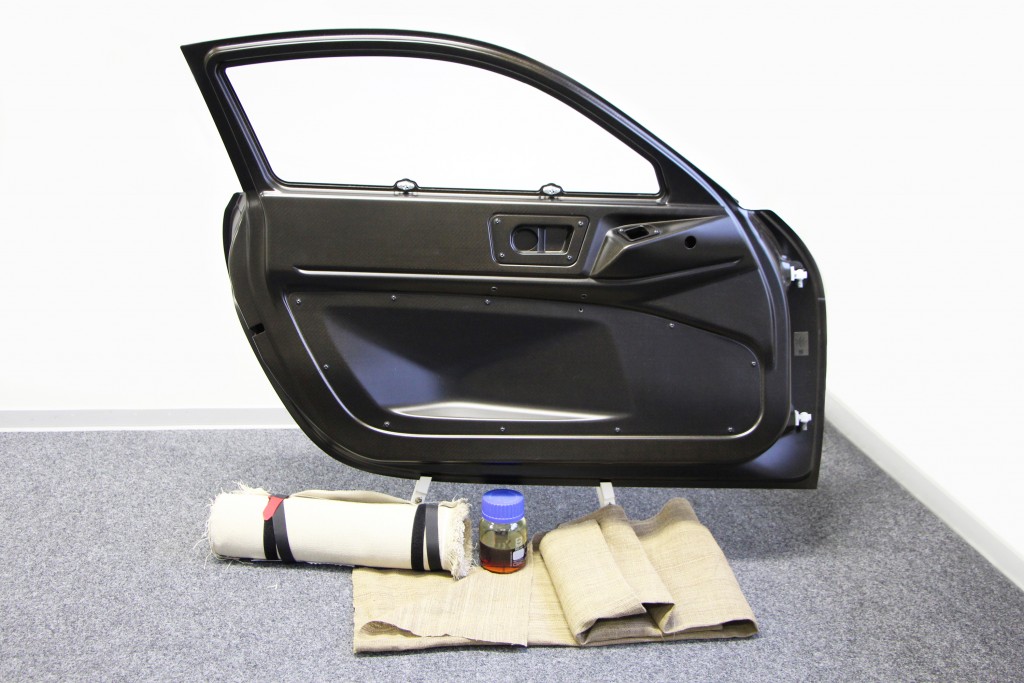
In automobile racing, lightweight bodies made from plastic and carbon fibers have been standard for many years because they enable drivers to reach the finish line more quickly. In the future, lightweight-construction solutions could help reduce the energy consumption and emissions of everyday vehicles. The catch is that the production of carbon fibers is not only expensive but also consumes considerable amounts of energy and petroleum. In collaboration with Porsche Motorsport and Four Motors, researchers at the Fraunhofer WKI have succeeded in replacing the carbon fibers in a car door with natural fibers. This is already being installed in small series at Porsche. The project team is now taking the next step: Together with HOBUM Oleochemicals, they want to maximize the proportion of renewable raw materials in the door and other body parts – using bio-based plastics and paints.
Carbon fibers reinforce plastics and therefore provide lightweight components with the necessary stability. Mass-produced natural fibers are not only more cost-effective but can also be produced in a considerably more sustainable manner. For the “Bioconcept-Car” pilot vehicle, researchers at the Fraunhofer WKI have developed body parts with 100 percent natural fibers as reinforcing components.
“We utilize natural fibers, such as those made from hemp, flax or jute. Whilst natural fibers exhibit lower stiffnesses and strengths compared to carbon fibers, the values achieved are nonetheless sufficient for many applications,” explained Ole Hansen, Project Manager at the Fraunhofer WKI. Due to their naturally grown structure, natural fibers dampen sound and vibrations more effectively. Their lesser tendency to splinter can help to reduce the risk of injury in the event of an accident. Furthermore, they do not cause skin irritation during processing.
The bio-based composites were successfully tested by the Four Motors racing team in the “Bioconcept-Car” on the racetrack under extreme conditions. Porsche has actually been using natural fiber-reinforced plastics in a small series of the Cayman GT4 Clubsport since 2019. During production, the researchers at the Fraunhofer WKI also conducted an initial ecological assessment based on material and energy data.
“We were able to determine that the utilized natural-fiber fabric has a better environmental profile in its production, including the upstream chains, than the fabric made from carbon. Thermal recycling after the end of its service life should also be possible without any problems,” confirmed Ole Hansen.
In the next project phase of the “Bioconcept-Car”, the researchers at the Fraunhofer WKI, in collaboration with the cooperation partners HOBUM Oleochemicals GmbH, Porsche Motorsport and Four Motors, will develop a vehicle door with a biogenic content of 85 percent in the overall composite consisting of fibers and resin. They intend to achieve this by, amongst other things, utilizing bio-based resin-hardener blends as well as bio-based paint systems. The practicality of the door – and possibly additional components – will again be tested by Four Motors on the racetrack. If the researchers are successful, it may be possible to transfer the acquired knowledge into series production at Porsche.
The German Federal Ministry of Food and Agriculture (BMEL) is funding the “Bioconcept-Car” project via the project-management agency Fachagentur Nachwachsende Rohstoffe e.V. (FNR).
Source
Fraunhofer WKI, press release, 2021-01-12.
Supplier
Bundesministerium für Ernährung und Landwirtschaft (BMEL)
Fachagentur Nachwachsende Rohstoffe e.V. (FNR)
Four Motors GmbH
Fraunhofer-Institut für Holzforschung Wilhelm-Klauditz-Institut WKI
Hobum Oleochemicals
Porsche
Share
Renewable Carbon News – Daily Newsletter
Subscribe to our daily email newsletter – the world's leading newsletter on renewable materials and chemicals

















